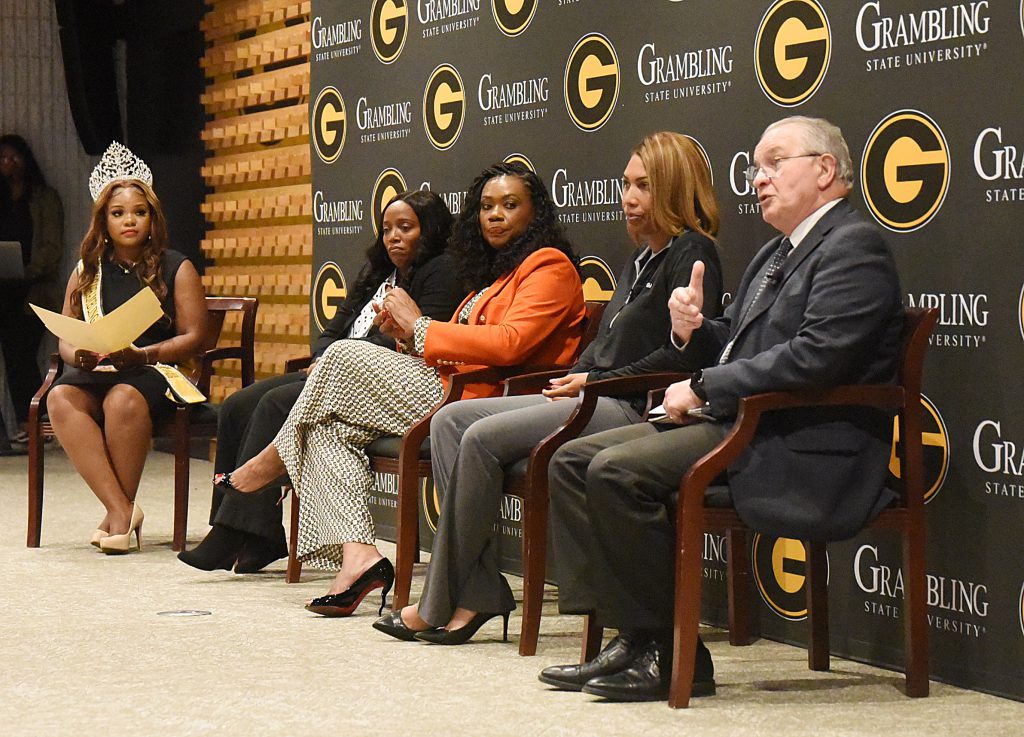
Grambling, La. – October 16, 2023 – Knowing who you are and what you have to offer, and always continuing to develop seemed to be the consensus message presented by a panel of four college recruiters as Grambling State University (GSU) presented “A Candid Conversation About Careers and Opportunities.”
The event, presented by the Center for Career and Professional Development and held in the Betty Smith Nursing Building Auditorium, was hosted by reigning Miss Grambling State Madison C. Johnson and featured panelists Jennifer Brooms from Weaver Financial, Dr. Quintrella Cahee with the Central Intelligence Agency (CIA), Annette Douglas from Entergy and Tony Magaro from Southwest Research Institute (SwRI) talking about how their careers started and offering advice on succeeding in the professional world.
Those four panelists were in Grambling to recruit college students at the 55th annual Lonnie B. Smith Jr. Career Fair held Thursday at the Frederick C. Hobdy Assembly Center in conjunction with GSU Homecoming Festivities.
Brooms, Cahee, and Douglas are all GSU graduates.
Magaro, who earned his undergraduate degree in biology from St. Mary’s University in Texas, talked about how he took that degree and continued his personal development to become Vice President of Human Resources at SwRI.
“When I started there, I was a biology major, so with that degree, I was assigned to work to ensure that during a wreck, the design of the vehicle could best minimize chances of injury to occupants of those motor vehicles,” Magaro said. “That was my job, it was a phenomenal start with a great organization.”
“The key is that I moved from that role into my role now in human resources through continued development. That’s one thing we certainly ask every one of our employees to do — to continue to develop themselves personally be it through their education, through certifications, through associations with professional organizations, I was able to do so, and now I am Vice President of Human Resources of an organization with 3,000 employees.”
Cahee, who majored in accounting at GSU before an internship led her to join the CIA, advised students to be true to themselves, even if that doesn’t always mean following the trail to big money.
“I actually started out in (human resources) for 15 years, but actually my degree is in accounting,” Cahee said. “Actually, I wanted to be a psychologist, but I didn’t want to go to graduate school even though I ended up doing so later on. At that time, the thought was if you get a degree in accounting, you make a lot of money, so that’s all I was thinking about — making a lot of money.”
Cahee said she remembered sitting in her apartment in Ruston on graduation night in tears because she realized she hated accounting.
“So, if I could talk to my 18-year-old self about heading to Grambling, I would tell myself to be true to who I am and focus not on the money but what I want to do with the rest of my life and how do I follow my purpose,” Cahee said. “I hadn’t opened myself up to what was really out there. Be agile. Be flexible and be open. That’s one of the things I learned from the CIA.”
Brooms said one thing she wished she had done as a GSU student but didn’t was going to what was then known as Career Services (now known as the Center for Career and Professional Development).
“That would have been a great starting point, but I didn’t have the guidance to tell me to go do it,” Brooms said. “I actually worked for a while and then went back to school to on a graduate degree at Southern and that’s when I realized I needed to go to Career Services. And I didn’t only go to Southern’s Career Fairs, I went to ones at LSU as well because I knew there might be companies there that weren’t at Southern.
“So for 2 1/2 years, I went to everyone at both universities. All the recruiters knew my face. They saw me every fall and every spring and by the time I graduated I had a full-time job at Price Waterhouse.”
When Johnson asked Douglas how she felt women could best earn equitable compensation and benefits from an employer, Douglas was ready to answer.
“I am working on a process right now on equity, compensation, and promotions within the organization,” Douglas said. “I would definitely tell women to know their value, speak up for themselves, and know what they can do and speak to it.
“Know your story, gain that experience, get that training, and speak to leadership. I encourage everyone to speak to leadership. Know your goals and have a plan. If you want to be a (vice president) within 5-7 years, speak to a VP that inspires you. Find out how they progressed in their career. Knowing your value and continuing development is the key.”
Douglas added that understanding generational diversity is crucial to succeeding in today’s professional world.
“Today is the first time we have five generations in the workplace,” Douglas said. “That knowledge transfer and understanding what everyone brings to the table is so important. Finding yourself and having those rap sessions with your peers and your department teams and groups and understanding what works and what doesn’t is so important.
“Getting to know each other in the workplace is the best thing to do, within your department, your teams, and your groups. Because if you know who you’re working with and you understand each other, then you can progress and be a better individual yourself and make your organization better as a whole.”

